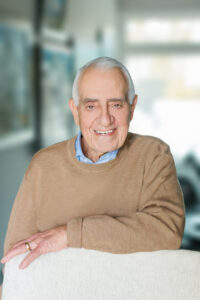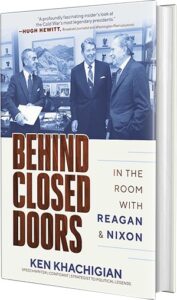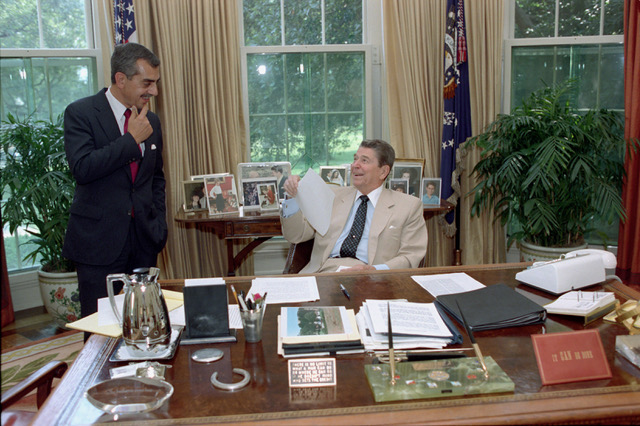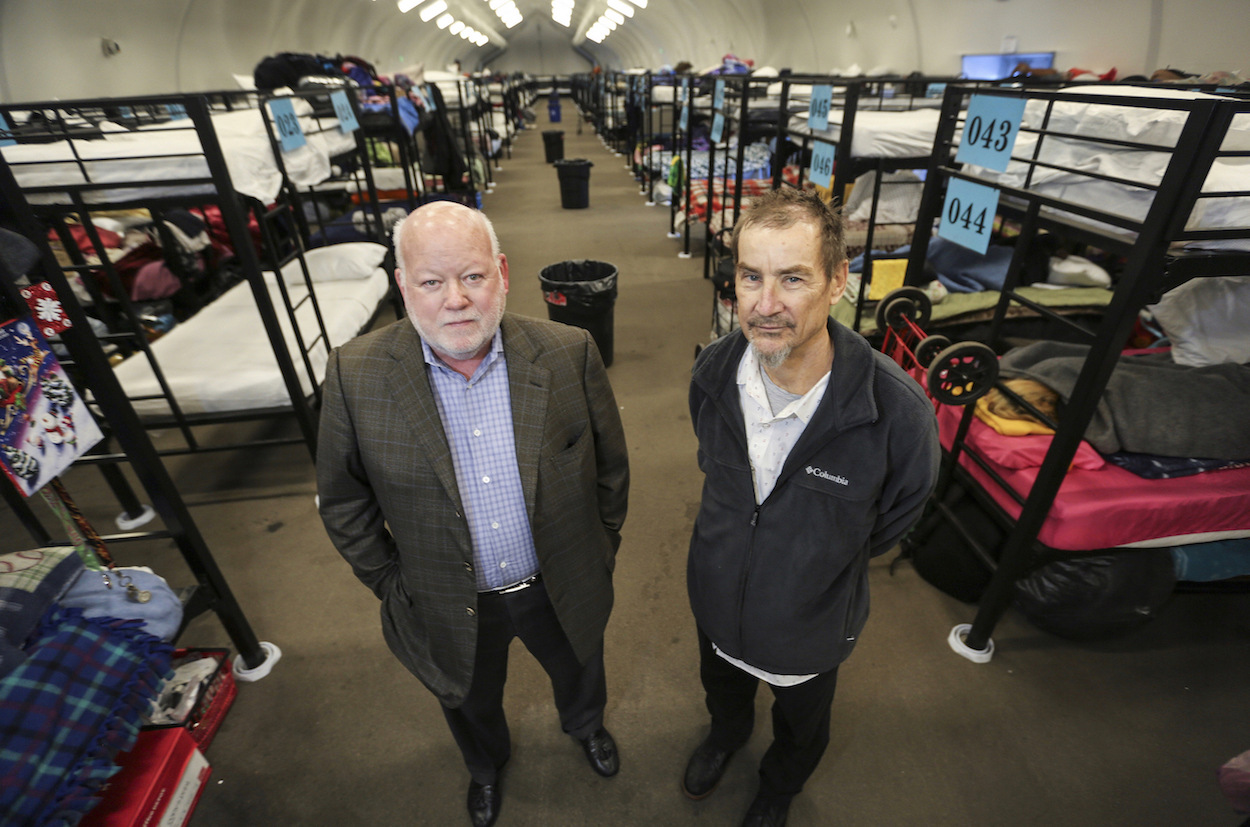Working for Presidents Nixon and Reagan – and advice for President Trump, too
Editor’s Note: Ken Khachigian is someone who’s had the rare opportunity to witness history from a ringside seat and influence it too. He’s the former communications advisor and speechwriter to two of the most significant U.S. presidents in the 20th century, Richard Nixon and Ronald Reagan. In this interview with SD METRO Associate Editor Doug Page, he details his time working for these two titans in American history in his new book, Behind Closed Doors: In The Room with Reagan & Nixon. The interview has been edited for brevity and clarity.
SD METRO: Ken, you were a young law student at Columbia University when you approached Richard Nixon’s office in the fall of 1967 about working for his campaign. But he didn’t announce he was running until February 1968. Who or what tipped you off that he might make a run for the Republican presidential nomination?

Ken Khachigian: There were articles in The New York Times hinting at a Nixon comeback and you could tell because he was surrounding himself with some new, young staffers. One of them was Pat Buchanan, a former editorial writer at the St. Louis Globe-Democrat, and another was Ray Price, who had been the editorial page editor of The New York Herald Tribune. And after having been very successful in 1966 campaigning across the country for candidates (the Republicans picked up 47 seats in the U.S. House of Representatives), it was clear Nixon was likely going to run for office. But people were rushing to campaign for Michigan Gov. George Romney and New York Gov. Nelson Rockefeller, the two leading candidates at the time. And there was another potential leading candidate, and that was Ronald Reagan, who had just been elected governor of California in 1966 and had starry-eyed visions of being in the Oval Office. Nixon was not the lead candidate in 1968. People weren’t rushing to be at his side, but I saw an opportunity to get in on the ground floor of the campaign.
SD METRO: What did you find attractive about him as a presidential candidate?
Ken Khachigian: I had run into him as a freshman in college at UC Santa Barbara when he was running for governor. I was on the debate team at UCSB, and my debate partners and I cornered him after a rally at San Marcos High School at Santa Barbara. He took three or four minutes to visit with us after a rally and talked to us about some debate tactics and skills. I also read his book, Six Crises, where he wrote about meeting Soviet leader Nikita Khrushchev, his time in Caracas, Venezuela, and his 1960 presidential election defeat to U.S. Sen. John F. Kennedy. I saw a lot of character in him and resilience.
I followed the 1966 midterm elections closely, noticing he campaigned hard for a lot of those Republican candidates when we had that landslide victory in the Congress, bringing in those new 47 Republicans into the U.S. House of Representatives. Nixon was very much part of that victory, bringing in dozens of new Republicans. He had a lot of energy and vigor, and the background of being in international politics, and being at President Eisenhower’s side as his vice president.
Nixon had better conservative credentials. I liked Ronald Reagan a lot, but then I thought it wasn’t his time. He’d only been elected the governor of California in 1966.
SD METRO: What was your first impression of Pat Buchanan?
 Ken Khachigian: He interviewed me and got me onto the Nixon campaign. My first impression was how extremely bright he was. He was a rapid-fire talker. He put me through my paces, and I thought I had a terrible interview because I was bragging about bringing something to the campaign that no one else had – having been raised on a farm in California. So, I thought I could bring my agricultural background and skills to the campaign that others couldn’t. So, he asked me what I thought of The Brannan Plan and I thought, “Oh my gosh, I know nothing about it.” I had to plead ignorance. I thought that doomed my interview. But Pat was up on all those things. He was extremely bright and very affable and everything else. I was unsure whether that doomed my candidacy. And, of course, later on, he teased me that coming out of Columbia University; he thought I was a Rockefeller spy.
Ken Khachigian: He interviewed me and got me onto the Nixon campaign. My first impression was how extremely bright he was. He was a rapid-fire talker. He put me through my paces, and I thought I had a terrible interview because I was bragging about bringing something to the campaign that no one else had – having been raised on a farm in California. So, I thought I could bring my agricultural background and skills to the campaign that others couldn’t. So, he asked me what I thought of The Brannan Plan and I thought, “Oh my gosh, I know nothing about it.” I had to plead ignorance. I thought that doomed my interview. But Pat was up on all those things. He was extremely bright and very affable and everything else. I was unsure whether that doomed my candidacy. And, of course, later on, he teased me that coming out of Columbia University; he thought I was a Rockefeller spy.
SD METRO: Nixon gets elected in 1968, and you join the White House Communications team. What was your favorite assignment when you were part of that team?
Ken Khachigian: My favorite assignment was probably trying to poke holes in the Democrat arguments against President Nixon’s policies. One of my jobs was to promote the president’s policies, whether it was domestic policies, and especially, we’re right in the midst of the Vietnam War, where the president was being criticized all the time. Anytime I could point out the opposing party’s inconsistencies and contradictions, that was probably my favorite assignment. I worked for Herb Klein, the former editor of the San Diego Union.
SD METRO: Nixon had many, many highlights during his time in office, including opening China as well and many others. But many remember that last speech he gave before he boarded the helicopter to leave the White House for the last time on August 9, 1974. I remember watching it from my aunt and uncle’s house in Cedar Rapids, Iowa. What was the atmosphere in the White House that day?
Ken Khachigian: I was part of the anti-impeachment team in the White House, one of the very few people who had the privilege of working with the Chief of Staff, Al Haig, and the defense counsels, James D. St. Clair and Fred Buzhardt, then working with (White House Press Secretary) Ron Ziegler to try to put on a defense for the president. I opposed Nixon’s resignation. I think I was the only one left that had opposed his resignation. I had been in meetings, day and night meetings, and I kept hour-by-hour notes, day-by-day, of those meetings of what we went through to try to protect his presidency. And then boom, he decided to resign. And so it was sort of a big shock for me because I had been working on a defense for the last year and a half of his presidency. Having heard his speech before the whole staff and then going up to the South Portico of the White House and watch him on the helicopter. It was a dreary day. It was a dreary, overcast day in Washington. A sultry, crummy day. And it was like that heavy feeling in your heart, your mind, and, suddenly, all the air goes out of your life, everything you work for has disappeared.
SD METRO: What did you see that perhaps a few others did, that you thought Nixon could prevail if was impeached and there was a trial in the Senate?
Ken Khachigian: I thought if we pointed out the hypocrisy of the case against him, the fact that so many of the charges were based on occurrences that took place in other presidencies, that there were such heavy precedent going back in previous presidencies in the 20th century. We knew a lot of what had taken place in the Roosevelt, Truman, Kennedy, and Johnson administrations, of violations of civil rights, violations of wiretapping laws, violations of tax laws and other things, the charges being made against President Nixon. And if we had taken those cases of hypocrisy to the House floor and confronted them, put a mirror to their face and fought it out, that it would’ve been advantageous to our side. But I think that we’d gotten to the point where everybody was war weary.
And the fight had gone out, the air had gone out of their sails, and they were just war weary after having fought against all the problems of the Vietnam War up until the truce talks and, finally, having gotten the truce in early ‘73. And then, of course, we had an Arab oil embargo after the Arab-Israeli War of 1973, and gas prices had gone up by 35%. People were paying a lot for gas, and there was an unruly mood in the nation and angry, too. The easiest thing was to take it all out on Richard Nixon. I thought we could still put on some kind of fight and take it to the floor and make the hypocrites that I believe were there, force them to a vote and make them have that vote put on their conscience and one way or the other, but it just wasn’t to be. The President knew the votes weren’t there, and rather than go through an impeachment, it was better for him to resign.
SD METRO: Besides the political charges, do you think some of his downfall was due to the economy? You mentioned the increase in gas prices and it’s not an economy that’s roaring along like it was in the 1960s. Inflation is creeping up.
Ken Khachigian: It was accumulation of that and the anger, the residue of what took place from the battles over the Vietnam War, from the day he took office, that was the headwind that he had from 1969 all through the end of the Vietnam War and the extraordinary partisanship. You have to remember that there was not one single majority in the House or Senate that he enjoyed while president.
For example, the Senate Watergate Committee, the initial resolution that was formed by the Senate Water Committee was introduced by Ted Kennedy, and that was out of pure vindictiveness by the Kennedy family against Richard Nixon. The partisanship was extraordinary, and that was another reason why I felt we should fight it out, because I thought there was such extraordinary partisanship and vindictiveness aimed at Richard Nixon, and especially when you had the Kennedy name behind it.
SD METRO: What was your impression of Gerald Ford?
Ken Khachigian: He was a very decent man, but I viewed him as a placeholder in the presidency. I don’t mean that in any mean-minded way, but he didn’t have the stature of President Nixon. He didn’t have the background, certainly, in foreign policy. You have to remember that Nixon served for eight years under one of the leaders of the free world, Dwight Eisenhower, and made his bones traveling the world. And even out of office, he traveled the world, and no one knew international affairs as he did. Ford didn’t have those credentials anywhere near that Nixon did. Ford’s strong suit was in dealing with the Congress. But basically, if you’re just a negotiator with the Congress, that’s not the only thing you bring into the presidency. And then I think his staff was nowhere near the quality that Nixon had. I think Ford basically had a pretty weak staff at the end of the day.
And his vice president, Nelson Rockefeller, was another placeholder. He ran a good race against Jimmy Carter, but then that’s not saying a whole lot. Carter was not a strong candidate. The harm Carter did to the American people was vastly much more substantial than anything Nixon ever did. The economic harm he did to people with the high interest rates and high inflation rates and high mortgage rates and unemployment, you can’t even match any of that to the charges made against Nixon.
SD METRO: When you’re back in California with now former President Nixon, and engaging with him almost daily, there are lots of worries about what could happen to him in the post presidency, too. And then, lo and behold, along comes David Frost. And you spent time working with the former president on the Frost interviews. What was the single biggest worry that you had, that perhaps President Nixon had, going into those interviews?
Ken Khachigian: I’ve devoted a whole chapter in the book to the Frost interviews. Nixon asked me to take leave for my work on his memoirs to help prepare him to oversee the preparation of the briefing books for his interviews with Frost. And I viewed Frost as a … viper is too strong of a word … but I viewed him as wanting to go for Nixon’s throat.
Frost would be looking to preen in front of his cohorts and his class of people, those in the media. And to do so, he couldn’t let up on Nixon in any respect. And even though he was charming and elegant, and purported to be fair and balanced and everything else. As I told the president, he was going to go for the throat. And so we had to prepare for a very tough, confrontational interview.
SD METRO: Did those interviews help propel him to becoming a successful author and be seen as a statesman?
Ken Khachigian: It turned out to be a very shrewd decision. The whole concept of doing his memoirs and the Frost interviews were very important watersheds. When we came to San Clemente after this resignation, he was almost broke. He had no income, no job. They were after him for back taxes, I think unfairly. They were seeking to disbar him in New York and in California. There were subpoenas flying all over the place. They were trying to just destroy him – even after he resigned. He had no source of financial resources. So, one thing was to do the memoirs, which paid him a big advance.
And then the Frost interviews came around, which also gave him a substantial financial resource ($600,000) The two of those things together also gave him the opportunity to do something very important: Put Watergate behind him, to answer the fundamental issues, not only talk about his life and his presidency and to provide a defense of what he had gone through. The first Frost interview on Watergate is still the most watched interview television show in the history of television. And as controversial as people might’ve seen it, and as angry as his critics were about it and everything else, as Nixon said later, “Look, we had to do this to get it behind us.” And you know what? Once it was done, once the memoirs were done, he was able to move on.
Then he moved to New York. He wrote seven or eight bestselling books. He became an international statesman again. Presidents Clinton and Reagan and others depended upon him for advice. And he went on to lead a relatively normal life. He traveled; he interacted with Mikhail Gorbachev; he interacted with heads of state; and he gave his answer to Watergate. He never had to answer for it again.
SD METRO: Was there any one thing he said that seals the deal? Where he basically says, “That’s behind me.” And let’s talk about his abilities. He’s the first president to open the door to China since it was closed during the Truman Administration.
Ken Khachigian: When he said, look, basically, “I impeached myself when I resigned.” And that essentially, he said, “Look, I may have misspoken on things. I didn’t have the full facts on everything going through Watergate, but on the very big things, I did not mislead the American people.” And he said, “I did not…” And he always said, “Look, I was not going to say I committed a crime. Because you have to have intent to commit a crime. And I wasn’t going to ever say that.” But he said, “I gave my opponents a sword. And they stuck it in, and they twisted it.”
And as he said, “They enjoyed it, they twisted it with relish.” And he faulted himself for providing that opportunity. The way he did that, showed, I think, regret about what he had done. But then he went on to talk about how he dealt with Vietnam, how he dealt with the opening to China, how he dealt with a lot of domestic issues. He got into it with Frost over what happened in China. But Nixon held his own. Frost had everything going for him because he was on the attack. Nixon never knew what the questions were going to be, but he was very well briefed and very sharp.
SD METRO: My impression from those pages where you talk about him post-presidency is that he might be beaten up, but he wasn’t defeated. He had a lot of vigor, a lot of fight left in him. He’s a relatively young guy at 61 years old, when he leaves office. What was your sense of his personality or his mental being after he left office?
Ken Khachigian: Initially I thought he was going to be sort of desperately down, and his morale would be as low as you could get. I thought he would have a sense of defeat in his life, but it was just the opposite. When I first saw him two weeks after his resignation, he admonished me, saying, “Ken, we can’t look back. We’ve got to look forward. We can’t get down. You can’t get down. We have to move on. We’ve got to put this past us.” And I thought that was just an amazing life lesson. He never let defeat put him down, even though we had some days in San Clemente where he’d sit there in his chair, and I’d look past him at the beautiful, blue view of the Pacific Ocean.
We’d meander in the conversations about his life, career and everything else. We’d get into conversations about his career, Winston Churchill or Khrushchev or Indira Gandhi or Eisenhower or what it was like in Congress dealing with people like Charlie Halleck of Indiana or Karl Mundt of South Dakota, or some sneaky thing that (FBI Director) Jack Hoover pulled off. We’d have a good laugh or some sad conversation during the time when Hubert Humphrey was dying of cancer. Nixon was having phone calls with Humphrey. It was like two old warriors commiserating with each other. Nixon was really holding Humphrey’s hand on his very last days. And then Nixon was telling me, “Look, Hubert was not a mean person. He was not a mean man.” He said, “We fought with each other, and he was tough on the campaign trail, but he was never a mean person.”
SD METRO: That’s an interesting thing that you bring up because most people don’t realize that behind closed doors, when the cameras aren’t running, and the reporters aren’t standing around, these guys, these politicians, at least then, had a relationship with one another. I mean, there was some respect there for their opponent, even though they obviously were coming at problems from opposite ends, but they realized, or they recognized that their opponent was also a human being and had a family, too.
Ken Khachigian: That’s true. I can’t say that he felt that way about every single person, but by and large, you could get on the phone with an opponent, a former opponent, and have a long chat about something going on in the past; and you’d be surprised at the Democrats who’d love to come visit with him out in San Clemente or the liberals. They’d leave with some pride, saying, “Hey, I had a visit with Dick Nixon.” So, they saw it as sort of a badge of honor to touch base with him. But he loved politics. He loved his life, he loved what he did, and we had just some just great conversations about those days and what it was like in the 50’s and 60’s, and even in the 40’s when he would talk about the Hiss case or what it was like running, working with Lyndon Johnson on some things. And it wasn’t always a piece of cake.
SD METRO: You saw them both, Nixon and Reagan. How would you describe the differences in personality between these two, how they both approached politics and then how they viewed the presidency or how they acted in the presidency?
Ken Khachigian: People have interesting views of the public personas of these two people. Reagan is seen as more outgoing, the more genial, the more easygoing one to deal with or to have a conversation with.
They view Nixon as the stern, formal, more difficult person to engage with. In a lot of ways, the opposite is true. Reagan was very guarded and did not bond with many people on his staff or in his inner circle. He had a very small inner circle, and I was blessed to be in one of those. I campaigned with him in 1980, and it’s in the crucible of a campaign – the long hours, the intense pressure, the cold coffee, stale doughnuts, and working under deadlines – that you gain a person’s confidence.
Our interaction was extremely warm and comfortable. But once our work was completed, he wasn’t someone to have a bull session with. He had only one true, true single person in his life he could embrace and that was Nancy. You could start a conversation with Nixon and bingo, he would start talking about a gubernatorial race or presidential primary or some historical fact, going back to, let’s say the ‘54 midterm congressional races. You could start engaging him in a 45-minute overview that he’d really get engaged with, and he would routinely call on Christmas and check in on New Year’s Eve, and I’d get notes from him frequently.
Those are not the kind of things that I would get from Reagan. Having said all that, I don’t want Reagan to seem indifferent or out of touch. They’re just different personalities. I had a wonderful, close relationship with both of them.
SD METRO: In the last debate that he had with President Carter, you mentioned the fact that ABC News’s Sam Donaldson sooner realized Reagan won that debate before Carter aides Jody Powell and Hamilton Jordan did. As you write, you were uncertain that he won, but Donaldson is the guy who says Reagan is victorious. Describe that moment.
Ken Khachigian: It was probably because I was so tired and was looking for him to do an absolute knockout blow, which he actually did.
During these debates you set a high standard. And I thought Carter probed some of Reagan’s weak points, and I didn’t see how the public necessarily would see it. But Reagan came up with that iconic line that I… The birth of which I provided for him three weeks earlier in Pennsylvania at the Oxford Mall. “Are you better off today than you were four years ago?” And it summed up everything better than anything else.
And of course, he came up with one of those wonderful quips of his own, and he took the sting out of one of Carter’s jives when he said, “There you go again.” Donaldson had a much more neutral view of how he looked at things. As a White House correspondent who had followed Carter, Donaldson probably saw Carter’s stiffness and weaknesses. Carter had a defensive cone around him. And what Donaldson saw was that Reagan did much, much better than anybody expected him to.
SD METRO: What was your biggest challenge as a speechwriter for Ronald Reagan?
Ken Khachigian: The biggest challenge was always trying to write better than he could because he was such a gifted writer. He was always coming up with some word that made things vivid to the message that he wanted to convey. That was always a challenge. And I think that was probably the biggest challenge I had.
SD METRO: Your book includes about 70 pages of President Nixon’s letters and memos giving advice to Ronald Reagan before he becomes president, and then during his presidency. I would think if you’re a serious history student or you’re a serious political science student, perhaps even a serious law student, or you’re going to run a campaign down the road, those pages of Nixon’s advice about how to win a campaign and how to manage the presidency would be worth their weight in gold.
As you saw the political atmosphere in the 1960s and certainly through the 1980s, and today, obviously it’s a very, very different political atmosphere. How do you compare and contrast it, and what seems to be the biggest change in some of the messaging that you’re seeing today compared to what we saw when you were very actively engaged in providing the messaging?
Ken Khachigian: The biggest difference is you have 24/7 social media that you have to meet the demands of; there’s a lot of clutter out there that you have to pierce through, and it becomes more and more difficult. Despite that, the president still has the advantage of dominating the news cycles. He has the bully pulpit that no one else has — despite the proliferation of podcasts, social media, Chat GPT, Instagram, and all the things I don’t even know about. The presidency is still primo and, if it’s used correctly, it can dominate.
SD METRO: Do you have any advice for President Trump in his messaging?
Ken Khachigian: It is hard to tell somebody who’s been successful how to change the delivery system, but I think he could be more effective. And that is to discontinue the scattershot press interviews, the preemptive efforts that he does with whether it’s in the Oval Office or on Air Force One and out on the South Lawn. Wherever he is, he can’t seem to pass up a microphone.
It dilutes his message, especially if he has a single, precise, clear kind of message to deliver any given day or any given week. If he’s out there with a proliferation of different interviews and with different outlets, with different sources, it really dilutes what he wants people to hear, especially if they’re off the cuff, and especially if they’re controversial.
I would recommend using the Oval Office for speeches where he really focuses on educating the American public on all the different things he wants to achieve, why they’re important, what’s been wrong with the system that he inherited, and how he can make it better. He’s having some problems right now because they understood everything when he was campaigning. Now it’s gotten confusing because he’s allowed his opponents to raise doubts.
SD METRO: Thank you, Ken.
Doug Page is reachable at dpage@sandiegometro.com




